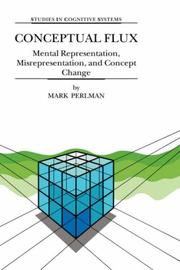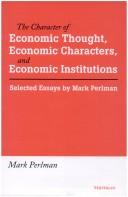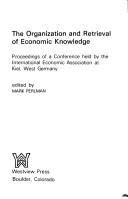| Listing 1 - 10 of 58 | << page >> |
Sort by
|

ISBN: 0792362152 9048154154 9401594627 Year: 2000 Publisher: Dordrecht : Kluwer,
Abstract | Keywords | Export | Availability | Bookmark
 Loading...
Loading...Choose an application
- Reference Manager
- EndNote
- RefWorks (Direct export to RefWorks)
How can one think about a thing, think something false about it, and still be thinking about that thing at all? If a concept is applied to something outside its meaning, how are we to say it does not mean that thing as well? The problem of misrepresentation is one of the central issues in contemporary philosophy of mind. Here, Mark Perlman criticizes the way all contemporary theories of mental representation seek to account for misrepresentation, concluding that it cannot be explained naturistically. Specifically, Perlman evaluates and criticizes the theories of mental content proposed by Fodor, Dretske, Millikan, Block, Harman and others, as well as examining verificationist approaches to meaning of Quine, Davidson and Stich. The book goes much further than criticism, however: Perlman formulates a naturalistic theory of representation that reluctantly accepts the unfortunate conclusion that there is no misrepresentation. He adds a pragmatic theory of content, which explains apparent misrepresentation as concept change. Mental representations can be good or bad in specific contexts and for specific purposes, but their correctness is not a matter of truth and falsity. The pragmatic approach to mental content has implications for epistemology, theories of truth, metaphysics, psychology, and AI (specifically connectionist networks). Readership: One of the most thorough examinations of mental representation and meaning holism available, this book should be read by everyone interested in the mind and how ideas can have meaning. It crosses boundaries from philosophy into psychology, linguistics, AI and cognitive science.
Meaning (Philosophy) --- Mental representation. --- Meaning (Philosophy). --- Philosophy of mind. --- Language and languages—Philosophy. --- Pragmatism. --- Artificial intelligence. --- Philosophy of Mind. --- Philosophy of Language. --- Artificial Intelligence. --- AI (Artificial intelligence) --- Artificial thinking --- Electronic brains --- Intellectronics --- Intelligence, Artificial --- Intelligent machines --- Machine intelligence --- Thinking, Artificial --- Bionics --- Cognitive science --- Digital computer simulation --- Electronic data processing --- Logic machines --- Machine theory --- Self-organizing systems --- Simulation methods --- Fifth generation computers --- Neural computers --- Idealism --- Knowledge, Theory of --- Philosophy --- Philosophy, Modern --- Positivism --- Realism --- Utilitarianism --- Experience --- Reality --- Truth --- Mind, Philosophy of --- Mind, Theory of --- Theory of mind --- Metaphysics --- Philosophical anthropology

ISBN: 0472107119 Year: 1996 Publisher: Ann Arbor (Mich.) : University of Michigan press,
Abstract | Keywords | Export | Availability | Bookmark
 Loading...
Loading...Choose an application
- Reference Manager
- EndNote
- RefWorks (Direct export to RefWorks)
Mark Perlman has made significant contributions to the field of economics and to the life of the discipline of economics. His creation of the' Journal of Economic Literature' is both an example of his contribution to the discipline and a symbol of the connecting threads of literateness, breadth of interest, and learning that run through his work. Born, raised, and largely educated in Madison, Wisconsin, where his father was one of the principal figures of the Wisconsin Institutionalist tradition, Perlman decided early that he would be a professor. He first worked in labor economics and industrial relations, doing comprehensive and original work on American and Australian institutions. Later he worked in public health, demographic economics, and the history of economic thought. All these strands in his work are represented in this volume and add together to show the odyssey of his academic life and his thoughts on the changing nature of the economics discipline. Resistant to labeling either by field or by philosophy, he ultimately sees himself as an economic historian interested in the evolution of the various facets of modern professional economics. A series of vignettes reveals the character and interests of such figures as G. L. S. Shackle, George Stigler, Simon Kuznets, Jacob Viner, and his father, Selig Perlman. Another distinctive feature of the book is the insights that the author offers about the publishing process gained from his experience both as a journal editor and as a remarkably successful editor of several books.
Economics --- Economics. --- Economists. --- Labor movement --- History. --- Philosophy. --- United States --- Economic conditions.

ISBN: 9780891587217 0891587217 Year: 1977 Publisher: Boulder, Colo.: Westview press,
Abstract | Keywords | Export | Availability | Bookmark
 Loading...
Loading...Choose an application
- Reference Manager
- EndNote
- RefWorks (Direct export to RefWorks)
Economics libraries --- Economics --- Information storage and retrieval systems
Book
Year: 1958 Publisher: Evanston, Ill.: Row, Peterson,
Abstract | Keywords | Export | Availability | Bookmark
 Loading...
Loading...Choose an application
- Reference Manager
- EndNote
- RefWorks (Direct export to RefWorks)
Book
Year: 1962 Publisher: New York : Wiley,
Abstract | Keywords | Export | Availability | Bookmark
 Loading...
Loading...Choose an application
- Reference Manager
- EndNote
- RefWorks (Direct export to RefWorks)
Book
Year: 1958 Publisher: Evanston (Illinois) Row, Peterson
Abstract | Keywords | Export | Availability | Bookmark
 Loading...
Loading...Choose an application
- Reference Manager
- EndNote
- RefWorks (Direct export to RefWorks)
Book
Year: 1961 Publisher: Cambridge Harvard University Press
Abstract | Keywords | Export | Availability | Bookmark
 Loading...
Loading...Choose an application
- Reference Manager
- EndNote
- RefWorks (Direct export to RefWorks)
Book
Year: 1962 Publisher: New York, N.Y. Wiley
Abstract | Keywords | Export | Availability | Bookmark
 Loading...
Loading...Choose an application
- Reference Manager
- EndNote
- RefWorks (Direct export to RefWorks)
Book
Year: 1958 Publisher: Evanston, Ill. Row, Peterson
Abstract | Keywords | Export | Availability | Bookmark
 Loading...
Loading...Choose an application
- Reference Manager
- EndNote
- RefWorks (Direct export to RefWorks)
Book
ISBN: 9781138963207 9781315658919 Year: 2016 Publisher: Abingdon Routledge
Abstract | Keywords | Export | Availability | Bookmark
 Loading...
Loading...Choose an application
- Reference Manager
- EndNote
- RefWorks (Direct export to RefWorks)
Economic geography --- economics --- urban areas
| Listing 1 - 10 of 58 | << page >> |
Sort by
|

 Search
Search Feedback
Feedback About UniCat
About UniCat  Help
Help News
News